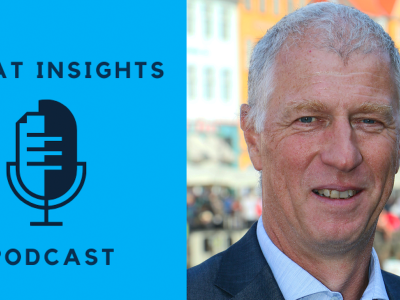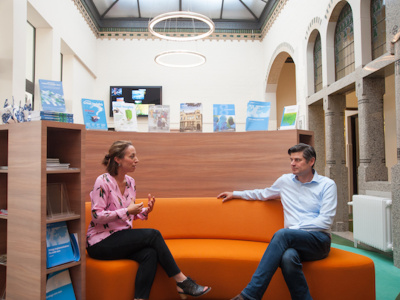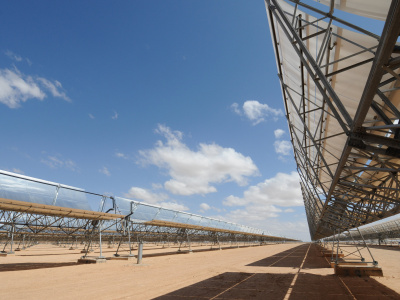
Here's how to accelerate investments in renewables with Africa
Africa’s greatest challenge is to ensure access to clean, affordable and reliable energy for the 600 million people who, today, live without it. To achieve this, African governments must take action, creating an enabling environment for foreign investments. Only by opening up the market to international investors will Africa be able to embrace a just energy transition
Africa is confronted with political, socio-economic, demographic, technological and climatic changes. Amid the challenges that these bring, the full use of renewable energy is essential for economic, social and human progress. A green recovery strategy is the best way to emerge from the current crisis stronger and more resilient.
The principles of sustainability, circular economy and shared prosperity are the most effective way to ensure universal access to energy. At the same time, they contribute to addressing climate change and offer businesses an extraordinary opportunity in terms of competitiveness and job creation, generating value for companies, customers and communities.
Europe is fully aware of this. It aims, with its European Green Deal, to be the first carbon-neutral continent in the world. But for Africa, the continent with the highest global rate of population growth, urbanisation and climate impacts, undertaking this path is even more urgent.
The African paradox
The good news is that Africa is a rough diamond when it comes to renewable energy. The continent has all the potential to shine. Using solar, wind and geothermal power, it could generate up to 24,000 TWh of electricity per year, corresponding to over 26 times the amount currently generated and approximately 90% of the energy produced worldwide in 2018. However, despite its outstanding potential, only 2% of the global renewable energy solutions were installed in Africa in the last ten years.
Multiple factors explain this paradox. Chief among them are economic and political instability, energy tariffs insufficient to recoup investments, long bidding processes, uncertain financial sustainability of public services, inadequate risk reduction tools and weak regulatory frameworks. It is clear that to overcome these multifaceted obstacles, involvement of the international private sector is necessary (and long overdue). Public finances are unable to provide the necessary investment funds.
A secure environment for international private investments
African governments’ agendas must prioritise creating an enabling environment for scaling up private investments, as these are essential for the development of Africa’s energy markets. Pursuing an energy transition without this would be like inaugurating a new building without a structural assessment or safety protocol.
Opening up the energy market to international investors will positively impact the everyday lives of Africans. But it will also require a common effort to develop unique and effective instruments and strategies to make African markets an appealing option for foreign investors.
Tax exemptions for renewables plants, well-constructed production-based support schemes (i.e., feed-in tariffs and public tenders dedicated to renewable energy) and discounted financing or concessional grants are just a few of the measures that African governments could implement to attract international private investments.
Investors need to feel safe and secure about their investments. In this regard, the Renewable Energy Solutions for Africa Foundation (RES4Africa) is working to create a new environment in which long-term financial commitments are possible thanks to financial and regulatory warranties throughout all phases of a project, backed by effective de-risking tools, such as power purchase agreements, tariff inflation indexing and expression in hard currency.
In addition, measures are being taken to ensure transparency and reliability, for example, by setting up detailed national energy policies, introducing strong regulation for independent power producers (with market participation and non-discriminatory grid access clauses) and establishment of an independent regulatory authority with clear and defined responsibilities.
RES4Africa’s renewAfrica initiative is a virtuous example of what can be done through an international cooperative approach. Welcomed by European Commission Vice President Frans Timmermans, the programme conducts advocacy actions directed to African governments and promotes the creation of a single EU-led de-risking instrument in support of private investments in the clean energy sector.
A joint commitment
RES4Africa and its network are committed to bringing together the efforts of Europe and Africa to meet the urgent energy needs of the African population and promote their social and economic development. Beyond that, investing in renewable resources in Africa makes a substantial contribution to the global struggle that has become a symbol of this generation: the one against climate change.
Renewable energy sources are the only possible road to truly sustainable development on a global scale. Only through synergies and collaborations between states and between the public and private sectors can we truly achieve the common goal of building a future more prosperous, peaceful and sustainable for all, leaving no one behind. To face our common challenges, Europe needs a strong Africa, just as Africa needs a strong Europe. RES4Africa is working to do its part.
About the author
Roberto Vigotti is Secretary-General of the Renewable Energy Solutions for Africa Foundation (RES4Africa). The Foundation’s mission is to create favourable conditions for scaling up investments in clean energy technologies to accelerate the continent’s just energy transition and transformation. See more at www.res4africa.org.
Read the full magazine issue
This article appears in the climate edition of ECDPM's Great Insights magazine – check out the full issue or the other articles and multimedia below.















